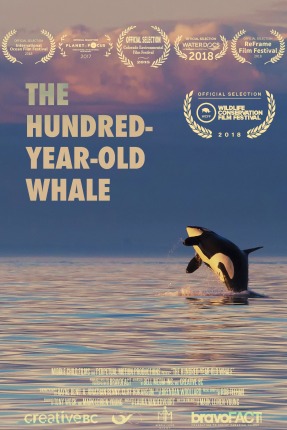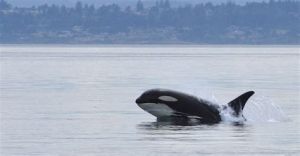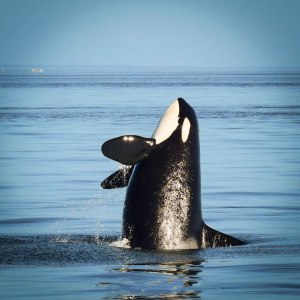
“From Hell’s Heart I stab at thee” decried Melville in “Moby Dick.” In the heyday of whaling, tens of thousands of sperm whales were destroyed for oil every year to light the cities of modern civilization. Advancing as the dominant force on earth, man slaughtered hundreds of thousands of the great mind of the oceans, the whales.
Is humanity capable of saving the seas? The ways the seas and the whales go, so does civilization. The seas are acidifying. Whales are key not just for their fecundation of the phytoplankton on which we depend for oxygen, but also for the entire immune system of the oceans. The oceans are being asked a reprieve. Without the life it sustains, humanity will drown. As Laurens van der Post wrote in “The Hunter and the Whale,” “Killing disproportionately was the last unforgiveable depravity.”
“Thinking Like a Dolphin,” National Geographic’s May issue cover story, confirms the urgency of the issue and underscores the supreme importance of cetaceans to humanity. I once heard Paul Watson speaking out for the cetaceans. He shared an anecdote from several decades ago, when he tried to stop a Russian whaler from harpooning a sperm whale. His words carried all the power of a fury decrying the modern Ahabs as he maneuvered with his zodiac trying to position himself between the long steel blade and the brain of one of the most remarkable beings on earth. Eventually the harpoon found its way into the body of the sperm whale causing untold agony.

In the depths of its pain, surrounded by pools of blood, as the ocean turned crimson, the whale’s eye, reflecting the earth in miniature, shot a glance of what seemed like a depth charge of pity at Watson and his men. It was pity, full of loss of an enormous warrior who has battled giant squid and the ferocious crushing solitude of the fathoms below. It was pity not for itself, but for the entire human race! When Watson discovered that the whale oil of exceptional quality was being used to lubricate Intercontinental Ballistic Missiles by the Soviet Union, his voice rose and trembled because he felt the human species had gone completely mad.
The peak days of whaling are over, most whale populations have survived, but some like the southern right whales are exceptionally vulnerable. The ignominy of hundreds of years of slaughter and now industrial pollution is crucifying the cetacean mind.
In ancient Greece and even more recently off the coast of India there are many stories of dolphins saving humans from drowning. Arion who invented the dithyramb (a wild ancient Greek choral hymn) tells the story of the dolphin that saved the life of a singer who was thrown from a ship into the sea. Pliny the Elder, Cicero, Oppian in his long poem “Halieutica,” and the great historian Herodotus tell similar tales of the incomparable human cetacean bond.

Korianos’ story as told by Plutarch is perhaps the most inspired. Some fishermen in Byzantium were to kill a group of dolphins. Korianos interceded, paid the fishermen and freed the dolphins from their net. The dolphins gave a long look at Korianos and then departed. A few weeks later, a storm raging off the coast capsized a boat on which Korianos was onboard. He alone survived and was saved by a dolphin that carried him to shore. Plutarch mentions that when Korianos died, a group of dolphins appeared before his funeral pyre with heads above water to mourn, as his human companions had done. When the smoke cleared, the dolphins disappeared and were never seen again! (from “The Dolphin, Cousin to Man“ by Robert Stenuit 1968).
* Reprinted from permission from the author, my good friend Cyril Christo.
Wildlife Conservation Film Festival
& Biodiversity Conference
Christopher J. Gervais, FRGS
Founder & CEO
Christopher@WCFF.org
http://www.WCFF.org
Facebook.com/WCFForg
Twitter: @WCFF_org
Twitter: @CJGERVAIS
Instagram: @wcff_2014
Vimeo.com/wcff
LinkedIn: Wildlife Conservation Film Festival
Wildlife Conservation Film Festival, Inc.














